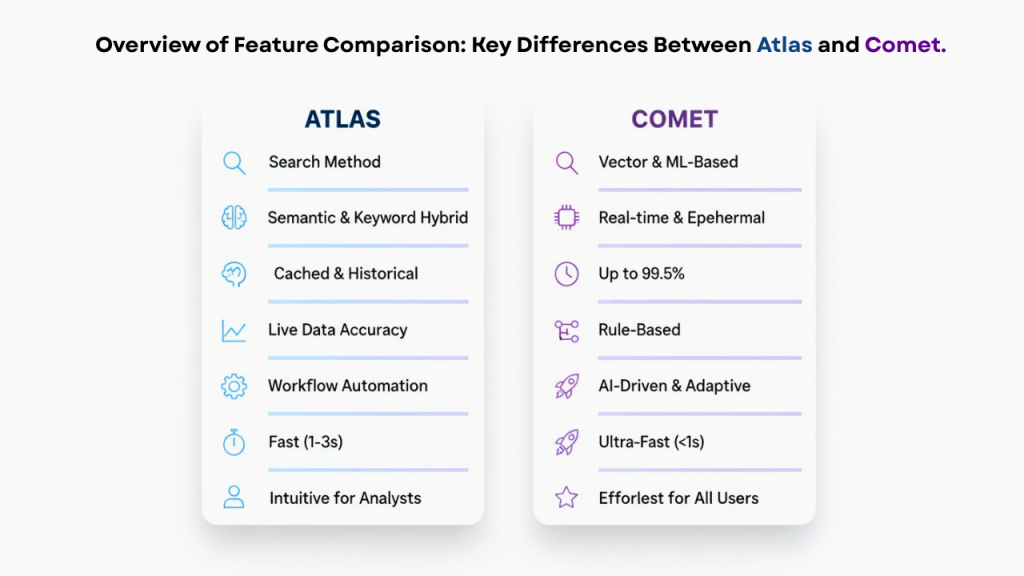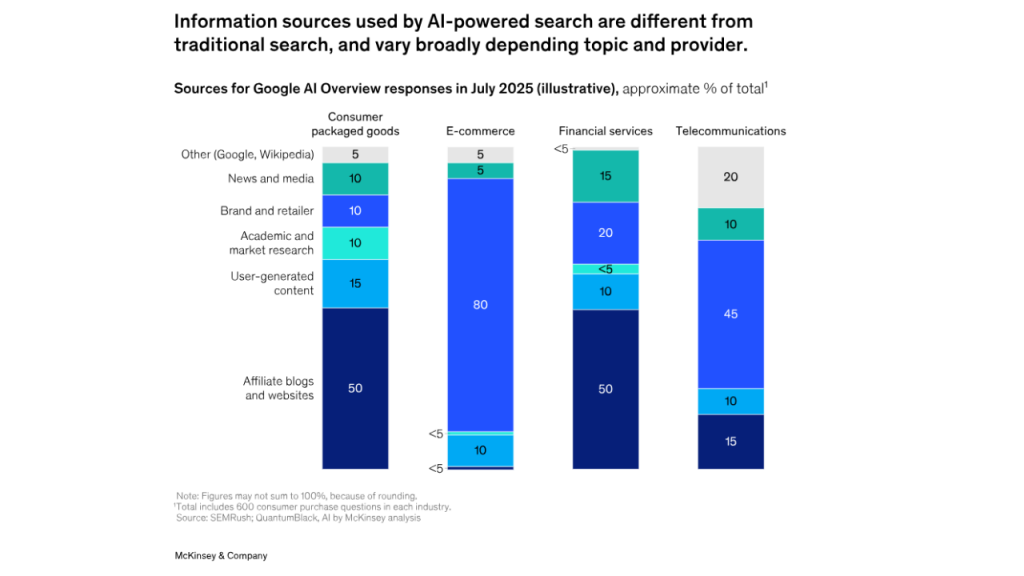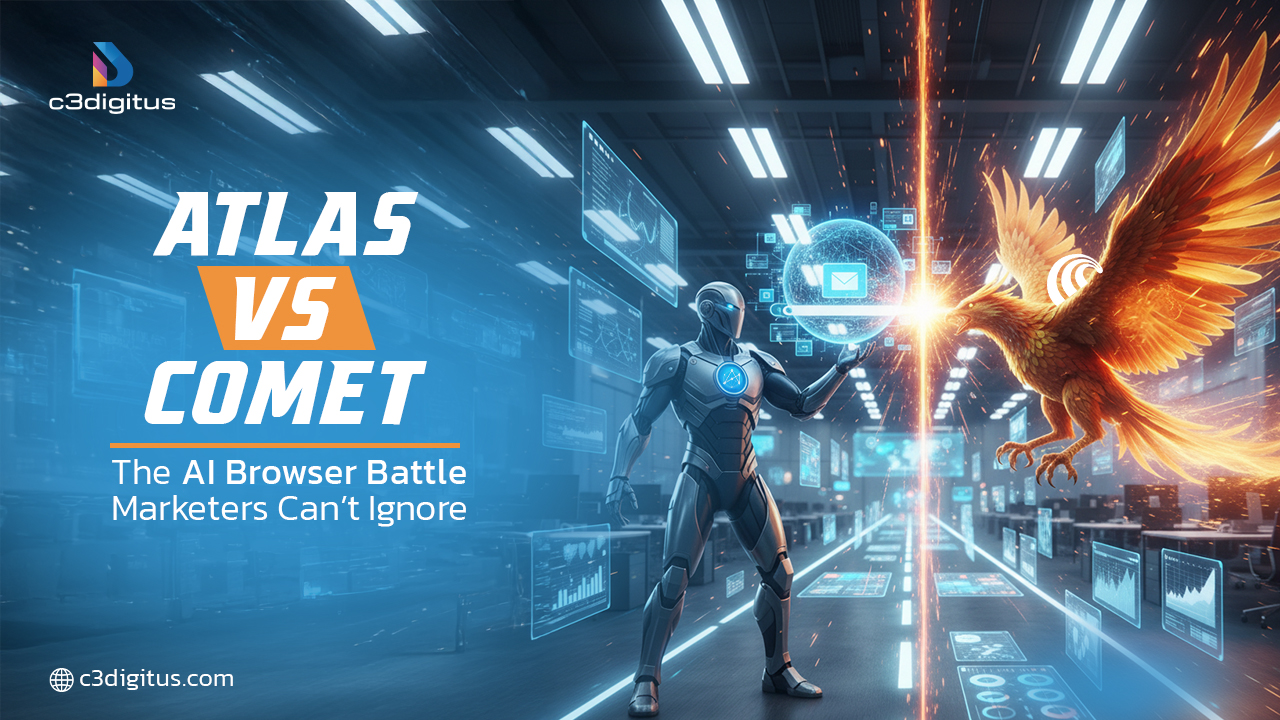Artificial intelligence has officially moved into your browser, a shift that aligns with how brands now optimize for AI-driven search experiences. Two powerful players, OpenAI’s Atlas and Perplexity’s Comet, are redefining what it means to search, research, and work online. Both browsers promise to bring ChatGPT-like intelligence right inside your daily workflow, making copy-pasting, endless tab switching, and manual searches a thing of the past.
So we put them to the test with real-world tasks that marketers deal with every day. From drafting emails to analyzing prices and managing schedules, here’s what happened when Atlas and Comet went head-to-head.
Understanding Atlas: The Browser That Thinks With You
Atlas feels familiar at first, but it’s doing something different behind the scenes — especially as browsers begin adapting to Google’s evolving AI Mode. It combines AI chat with traditional web search. So when you ask a question, you get both AI-generated answers and regular search results in the same view. This shift is part of the rise of AI-native browsers, where search and reasoning increasingly merge into one experience.
To understand how Atlas and Comet differ at their core, here’s a quick feature-level comparison. This high-level snapshot helps clarify why they behave so differently in performance, data accuracy, automation, and real-time tasks.

The real magic is in its conversational memory. It understands follow-up questions and remembers context like your location, currency, and topic. Ask about planning a Japan trip, and it will automatically show you costs in rupees, assuming you’re in India. It’s designed to feel like a dialogue with the internet rather than a string of disconnected searches.
The No Copy-Paste Era: Atlas Sidebar in Action
For marketers who live inside Google Docs, Notion, or analytics dashboards, the sidebar in Atlas is a quiet revolution. Let’s say you’re reading a 30-page industry report. Normally, you’d copy chunks into ChatGPT to summarize or rewrite them. With Atlas, you simply click an “Ask ChatGPT” icon on the page, and the AI appears right beside it, ready to summarize or extract key points.
This saves time, but it also keeps you in the zone. You’re no longer switching tabs or losing context. For marketers juggling content audits, product research, or campaign analysis, that’s a huge productivity gain.
Smarter Shopping and Instant Review Analysis
Here’s where Atlas shows off its AI depth. Imagine you’re analyzing products for an affiliate campaign or doing competitive benchmarking. You land on a product page with thousands of reviews. Instead of scrolling endlessly, you just ask Atlas, “Summarize all reviews and tell me the pros and cons.”
It reads everything instantly and gives you a breakdown that would normally take an hour. For performance marketers, this is gold. You can identify pain points, pricing perceptions, or product satisfaction trends within seconds.
Inline Writing: AI That Lives in Every Text Box
Atlas turns every text box into a creative playground, echoing what early reviewers are noticing about Atlas and Comet as they test how deeply AI can integrate into everyday workflows.
You highlight your text, click the ChatGPT icon, and tell it what to do. Need your cold email rewritten in a friendlier tone? Done. Want your social caption to sound punchier? It’s instant.
No more juggling tabs or running separate tools. The AI works right where you write, inside Gmail, LinkedIn, or any web form. For marketers and copywriters, this means you can polish content on the fly without breaking your workflow.
Searchable Browser Memory: Recall Anything Instantly
Marketers often browse dozens of articles, tools, and campaigns every day. The memory feature in Atlas lets you search your entire browsing history using natural language. You can literally ask, “Show me the article about AI ad optimization I read last week,” and it appears.
It’s off by default for privacy reasons, but when enabled, it turns your browser into a searchable personal archive. Imagine having every campaign idea, tool, and insight you’ve ever looked at available on demand.
Agent Mode: Automation Meets Control
Agent Mode is where Atlas gets ambitious. It can open sites, find flights, look for coupons, and even fill out forms. It’s like having a digital intern who clicks for you.
However, it’s still a work in progress. Some tasks take longer than expected, and the browser always asks for permission before doing anything sensitive. These early limitations reflect how AI-driven search is redefining digital behavior, pushing browsers closer to automated action engines.
This built-in checkpoint ensures that you stay in control of what’s executed.
Comet Steps In: The Challenger from Perplexity
Perplexity’s Comet browser takes a slightly different approach. It aims for speed, polish, and simplicity. While Atlas focuses on control and accuracy, Comet prioritizes ease of use. It’s fast, intuitive, and often produces better-sounding text responses with minimal effort.
The tradeoff? Comet sometimes uses summarized sources instead of live website data. That means it’s great for research and ideation, but not always for real-time validation or transactions.
The Five Real Tests
To find out which browser truly helps marketers work smarter, we tested both on five real-world tasks.
Test 1: Email Drafting
Both were asked to turn a casual message into a professional business email. Atlas worked instantly, recognizing the vague prompt and inserting the polished version into Gmail. Comet needed clearer instructions but produced a more natural-sounding final draft.
Result: Comet wins for tone and style. Atlas wins for contextual understanding.
Test 2: YouTube Timestamp Search
Each was asked to find a specific moment in a video. Comet located it faster and skipped ads automatically. Atlas identified the correct video first but stumbled on the playback controls.
Result: Comet wins for speed and accuracy.
Test 3: Price Comparison Across Websites
Both were asked to find iPhone prices across major Indian retailers. Comet responded faster but used article summaries instead of visiting real pages. Atlas took longer but fetched live prices and actual offers.
Result: Atlas wins for accuracy and real-time data.
Test 4: Financial Analysis
Comet produced graphs and context, while Atlas provided a plain numerical answer. Both gave different figures, highlighting how AI might interpret financial metrics differently.
Result: Comet wins for presentation and insights. Atlas needs clarity on metric definitions.
Test 5: Calendar Scheduling
Both were asked to find free time slots and draft an invite email. Comet created a solid draft but stopped there. Atlas went all the way, integrated with the calendar, and drafted the email in Gmail with permission before sending.
Result: Atlas wins for automation and end-to-end workflow.
Final score: Comet 2, Atlas 2.
What This Means for Marketers
The tie isn’t really a tie. Each browser plays to different strengths, and understanding AI Overviews is now part of evaluating how these browsers interpret and deliver information.
Comet is for marketers who need speed, brainstorming, and quick turnarounds. It’s like a fast-thinking strategist who gives you ideas in seconds.
Atlas is for marketers who want precision, contextual workflows, and data you can trust. It’s like having a capable assistant who can not only suggest but also execute.
In practice, a content strategist might use Comet to outline ideas and use Atlas to validate data, automate reports, or finalize deliverables.
AI browsers don’t simply fetch information from one source the way traditional search engines do. They blend data from brand sites, news, research, user-generated content, and affiliate sources in different proportions depending on the query. This chart from McKinsey illustrates how AI-powered search shifts its information sources across industries, which explains why Atlas and Comet often deliver different answers even when asked the same question.

The Future of Browsing Is Work Itself
The real story here isn’t about which browser wins. It’s about how AI is redefining what a browser even is. It’s no longer just a place to look for information. It’s becoming a workspace where you research, write, analyze, and act, all in one flow.
For marketers, this shift is massive. Research gets faster, execution gets smarter, and personalization becomes second nature. Those who learn to work with these browsers instead of around them will find their daily workflows evolving naturally into the next level of productivity.
The Bottom Line
Atlas gives you control and deeper integrations. Comet gives you speed and simplicity. Both are changing how marketers discover, analyze, and create online.
If your work depends on multitasking between tabs, gathering insights, and writing fast, these AI browsers are not just tools; they’re game changers.



